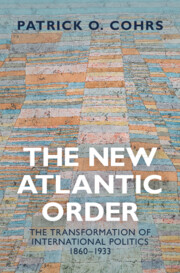Book contents
- The New Atlantic Order
- The New Atlantic Order
- Copyright page
- Dedication
- Contents
- Acknowledgements
- Abbreviations
- Maps
- Introduction
- Part I Inevitable Descent into the Abyss?
- Part II The Greatest War – and No Peace without Victory
- Part III Reorientations and Incipient Learning Processes
- 10 Towards a Progressive Atlantic Peace of the Victors
- 11 The Search for a New Equilibrium – and an Atlantic Concert
- 12 The Search for Security and an Atlantic Alliance of the Victors
- 13 A New Beginning?
- Part IV No Pax Atlantica
- Epilogue The Political Consequences of the Peace
- Bibliography
- Index
12 - The Search for Security and an Atlantic Alliance of the Victors
The Reorientation of French Approaches to Peace and International Order
from Part III - Reorientations and Incipient Learning Processes
Published online by Cambridge University Press: 22 April 2022
- The New Atlantic Order
- The New Atlantic Order
- Copyright page
- Dedication
- Contents
- Acknowledgements
- Abbreviations
- Maps
- Introduction
- Part I Inevitable Descent into the Abyss?
- Part II The Greatest War – and No Peace without Victory
- Part III Reorientations and Incipient Learning Processes
- 10 Towards a Progressive Atlantic Peace of the Victors
- 11 The Search for a New Equilibrium – and an Atlantic Concert
- 12 The Search for Security and an Atlantic Alliance of the Victors
- 13 A New Beginning?
- Part IV No Pax Atlantica
- Epilogue The Political Consequences of the Peace
- Bibliography
- Index
Summary
Chapter 12 reassesses the peace conceptions and reordering and security policies of Clemenceau and the other authors of the French programme for the Paris Peace Conference. It argues that while their key aim undoubtedly was to secure France against what they saw as the critical threat of renewed German aggression they came to pursue new, essentially transatlantic strategies to this end, which came to concentrate on efforts to establish, in cooperation with Britain and the United States, a new Atlantic alliance and security community. It illuminates the underlying assumptions and rationales of the ambitious French agenda, showing that it too was significantly reorientated between the armistice and Versailles. Finally, it explores how far Clemenceau, his main adviser André Tardieu and other French policymakers had drawn constructive lessons and consequences from the catastrophe of the war – and how far their aims and strategies, which focused on containing and initially isolating postwar Germany, indeed opened up realistic perspectives of securing peace and creating a durable Atlantic and global order.
Keywords
- Type
- Chapter
- Information
- The New Atlantic OrderThe Transformation of International Politics, 1860–1933, pp. 479 - 533Publisher: Cambridge University PressPrint publication year: 2022

